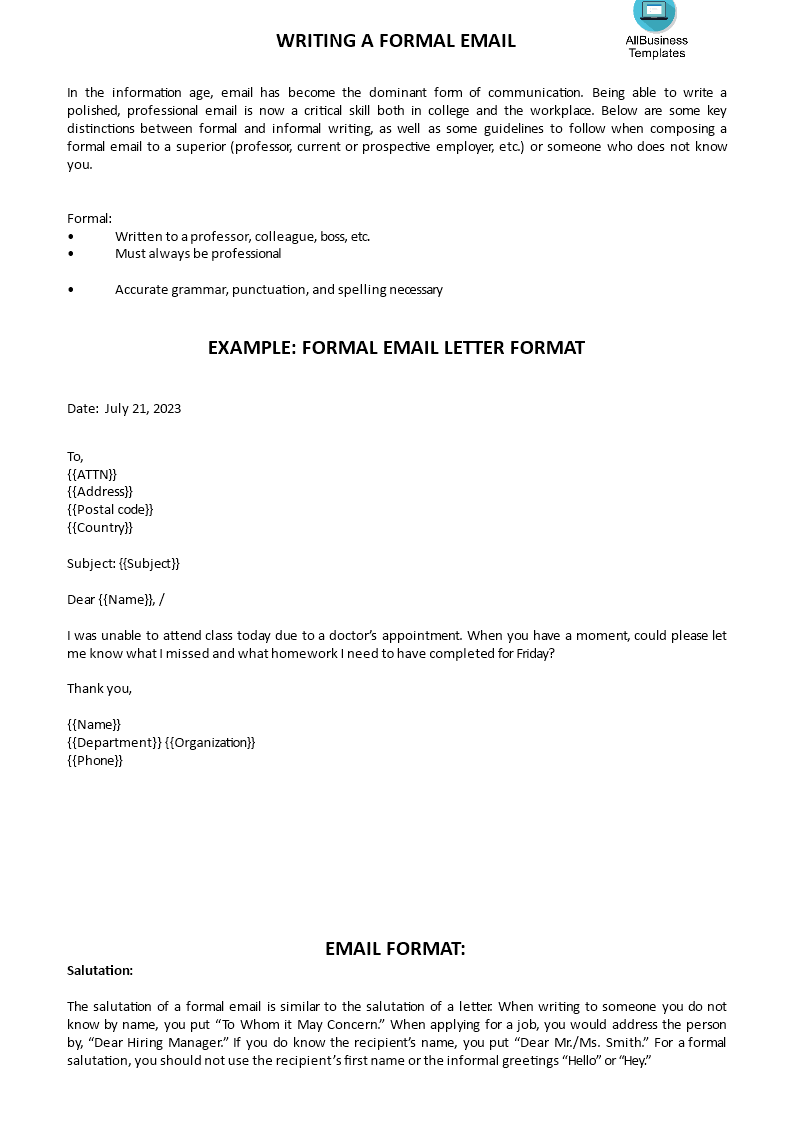Formal Email Signature
Sponsored Link免费模板 保存,填空,打印,三步搞定!

Download Formal Email Signature
微软的词 (.docx)免费文件转换
- 本文档已通过专业认证
- 100%可定制
- 这是一个数字下载 (50.49 kB)
- 语: English
Sponsored Link
How to write a formal Email and how to place a formal email signature? We provide a perfectly written Formal Email Signature that fits your needs!
In the era of information, email has emerged as the predominant means of communication. Possessing the ability to craft polished and professional emails has become an essential skill in both academic and professional environments. To effectively communicate with superiors, such as professors or current/prospective employers, it is crucial to understand the distinctions between formal and informal writing. The way you present yourself is important and should always get your utmost attention.
Below, there are rules you can follow when writing a formal letter like a Formal Email Signature. You will find some important differentiators and guidelines to adhere to when composing a formal email:
Formal vs. Informal Writing:
In formal writing, the language is more structured and respectful, maintaining a level of professionalism suitable for professional settings. In contrast, informal writing adopts a more casual tone, akin to conversation with friends or acquaintances.
Addressing the Recipient:
When writing to a superior or someone unfamiliar to you, always use a respectful and appropriate salutation. For instance, use "Dear Professor [Last Name]" or "Dear Mr./Ms. [Last Name]" to address them properly.
Clear and Concise Subject Line:
Craft a subject line that clearly conveys the purpose of your email. This helps the recipient prioritize and respond to your message promptly.
Introduction and Purpose:
Begin your email with a polite and concise introduction, stating your name, your affiliation (if applicable), and the reason for reaching out. For instance, "My name is [Your Name], and I am a student in your [Course Name/Department]. I am writing to inquire about [the purpose of your email]."
Respectful Tone and Language:
Maintain a respectful and courteous tone throughout the email. Use appropriate language and avoid any slang or jargon that might be unclear to the recipient.
Professional Formatting:
Use a professional email format with proper paragraphs and spacing. Break your email into logical sections for better readability.
Clarity and Specificity:
Clearly state the purpose of your email and be specific in your requests or questions. Avoid ambiguity to ensure the recipient understands your intentions.
Proofreading and Editing:
Before hitting the send button, proofread your email to check for any grammatical errors or typos. A well-edited email reflects positively on your attention to detail.
Closing and Gratitude:
Conclude your email with a courteous closing, such as "Thank you for your time" or "Sincerely." Express appreciation for the recipient's attention and consideration.
Signature:
Include a professional signature with your full name, contact information, and any relevant affiliations.
By following these guidelines and understanding the distinctions between formal and informal writing, you can compose effective and respectful emails that leave a positive impression on your recipients in the academic and professional world.
As you know, communicating in a professional manner will get you respect and will bring you new opportunities in life and business. Therefore, we support you by providing this Formal Email Signature template and you will see you will save time and increase your effectiveness. Please note this template is provided for guidance only. Letters and other correspondence should be edited to fit your personal situation.
Download this formal Formal Email Signature template now, good luck!
DISCLAIMER
Nothing on this site shall be considered legal advice and no attorney-client relationship is established.
发表评论。 如果您有任何问题或意见,请随时在下面发布
相关文件
Sponsored Link

